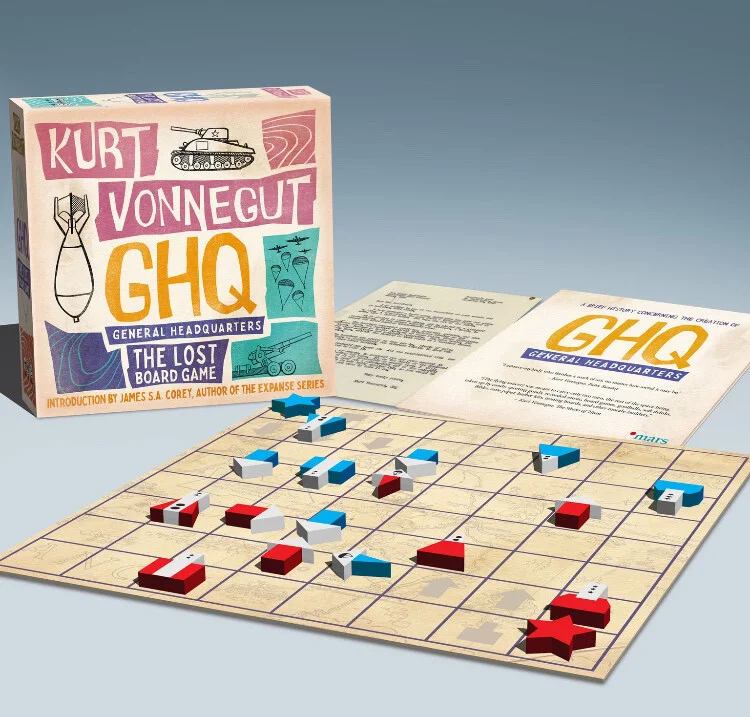
Kurt Vonnegut’s life was not without its ironies. Fighting in World War II, that descendant of a long line of German immigrants in the United States found himself imprisoned in Dresden just when it was devastated by Allied firebombing. To understand the relevance of this experience to his literary work, one need only know that his captors made him live in a slaughterhouse. It’s not surprising that anti-war sentiments would surface again and again in the books he wrote after coming home. But one would hardly expect him to have spent his time away from the writing desk on a military-themed board game.
“After releasing his first novel, Player Piano, in 1952, to positive reviews and poor sales, he needed other streams of income to support his growing family,” writes the New York Times’ Julia Carmel of the young Vonnegut. Of all his endeavors — which included public relations, a car dealership and a very brief stint at Sports Illustrated — he was most passionate about designing a board game called General Headquarters.” Readers of Vonnegut’s novels might expect a sardonically didactic object lesson on the futility of war, but in fact, “GHQ is a fast-paced two-player battle game in which each player maneuvers military units — infantry, armored vehicles, artillery and an airborne regiment — to capture the other player’s headquarters.”
Vonnegut never did manage to sell the game, which has only just come available for purchase at Barnes & Noble stores. Its long-delayed production was the project of a tabletop game designer called Geoff Engelstein, who ran across a brief mention of GHQ that eventually inspired him to inquire about the game’s status with the writer’s estate. The 40 pages of notes amid Vonnegut’s papers include several revisions of its rules, but also pitch letters to board-game companies suggesting that GHQ could “become the third popular checkerboard game” — and even “be used to train cadets at the U.S. Military Academy at West Point.”
Despite probably having missed its chance to enter the standard military-academy curriculum, the game could nevertheless become a must-have among collectors of Vonnegutiana. According to the Kurt Vonnegut Museum & Library’s online store, “this first edition of GHQ features deluxe wooden pieces and a 24-page commentary booklet, showing Kurt Vonnegut’s actual design notes to give insight into his creative process.” It may “lack the signature dark sense of humor that runs through Mr. Vonnegut’s writing,” as Carmel puts it, but it surely couldn’t be without his less widely acknowledged — but no less characteristic — instinct for entertainment value.
Related content:
Kurt Vonnegut Diagrams the Shape of All Stories in a Master’s Thesis Rejected by U. Chicago
22-Year-Old P.O.W. Kurt Vonnegut Writes Home from World War II: “I’ll Be Damned If It Was Worth It”
A New Kurt Vonnegut Museum Opens in Indianapolis … Right in Time for Banned Books Week
The Fear and Loathing in Las Vegas Board Game, Inspired by Hunter S. Thompson’s Rollicking Novel
Jack Kerouac Was a Secret, Obsessive Fan of Fantasy Baseball
Based in Seoul, Colin Marshall writes and broadcasts on cities, language, and culture. His projects include the Substack newsletter Books on Cities and the book The Stateless City: a Walk through 21st-Century Los Angeles. Follow him on Twitter at @colinmarshall or on Facebook.


It’s Great…
I Don’t Know Anything Else!
For whatever reason, B&N have sadly declined to make this game available to order for any address that’s located in the UK. Same goes for the Kurt Vonnegut Museum.